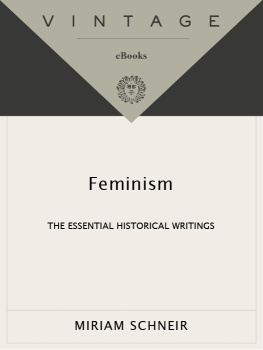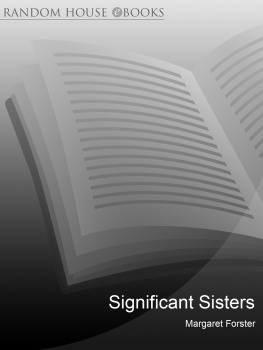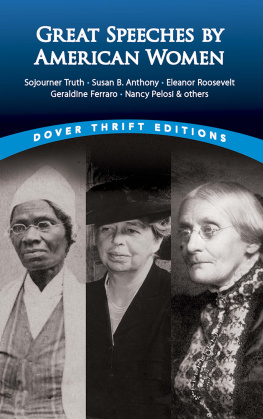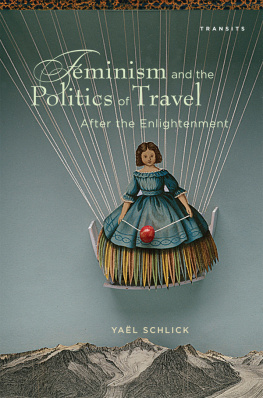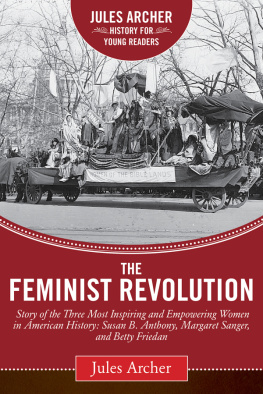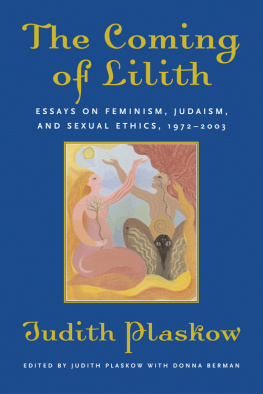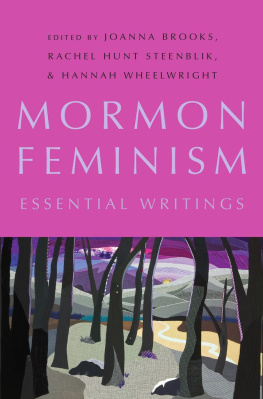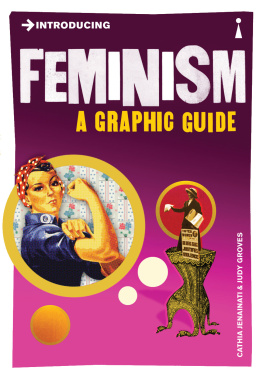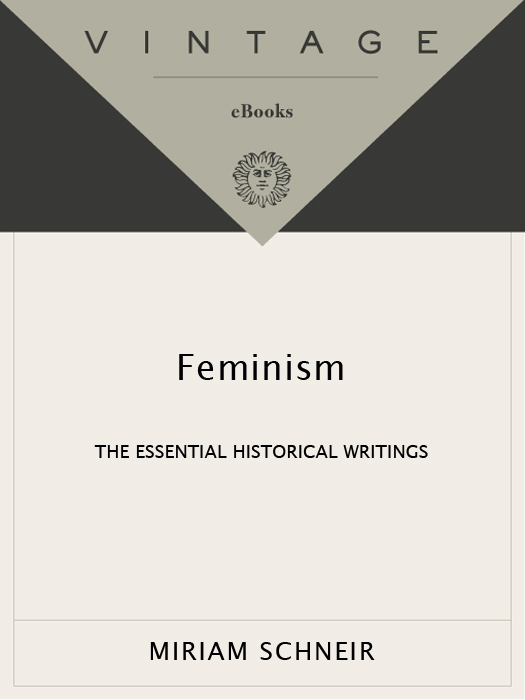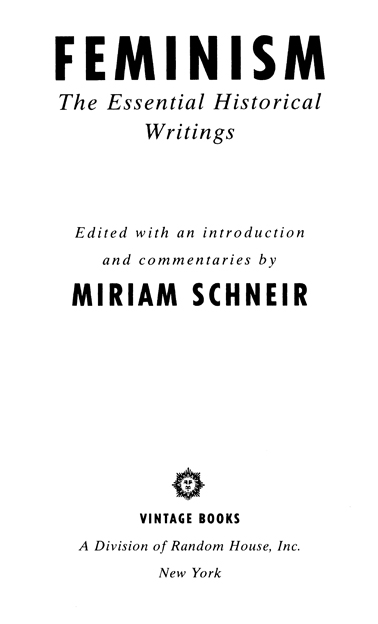VINTAGE BOOKS EDITION, JUNE 1994
Copyright 1972, 1992 by Miriam Schneir
All rights reserved under International and Pan-American Copyright
Conventions. Published in the United States by Vintage Books, a division of Random House, Inc., New York. Distributed in Canada by Random House of Canada Limited, Toronto. Originally published in somewhat different form by Vintage Books, a division of Random House, Inc., New York, in 1972.
Library of Congress Catalog Card Number: 70-159371
Acknowledgment is gratefully extended for permission to reprint from the following:
The Letters of George Sand, selected and edited by Veronica Lucas, first published 1930 by George Routledge & Sons Ltd., London.
Reprinted by permission of Routledge & Kegan Paul Ltd., London.
The Origin of the Family, Private Property, and the State, by Friedrich Engels. Copyright, 1942, by International Publishers Co., Inc. Reprinted by permission of International Publishers Co., Inc., N.Y.
Woman and the New Race, by Margaret Sanger. Copyright, 1920, by Brentanos Inc.; copyright, 1940, by Margaret Sanger. Permission to reprint by Grant Sanger, M.D., is gratefully acknowledged.
Reminiscences of Lenin, by Clara Zetkin. Copyright, 1934, by International Publishers Co., Inc. Reprinted by permission of International Publishers Co., Inc., N.Y.
A Room of Ones Own, by Virginia Woolf. Copyright, 1929, by Harcourt Brace Jovanovich, Inc.; copyright, 1957, by Leonard Woolf. Reprinted by permission of Harcourt Brace Jovanovich, Inc., N.Y., and The Hogarth Press Ltd., London.
On Understanding Women, by Mary R. Beard. Copyright, 1931, by Longmans, Green & Co.; copyright, 1959, by William Beard and Miriam Beard Vagts. Reprinted by permission of Arlene Beard and Detlev Vagts.
ISBN0679753818
Ebook ISBN9780804152464
www.vintagebooks.com
v3.1_r1
We who like the children of Israel have been wandering in the wilderness of prejudice and ridicule for forty years feel a peculiar tenderness for the young women on whose shoulders we are about to leave our burdens. The younger women are starting with great advantages over us. They have the results of our experience; they have superior opportunities for education; they will find a more enlightened public sentiment for discussion; they will have more courage to take the rights which belong to them. Thus far women have been the mere echoes of men. Our laws and constitutions, our creeds and codes, and the customs of social life are all of masculine origin.
The true woman is as yet a dream of the future.
ELIZABETH CADY STANTON ,
at the age of seventy-two, speaking
to the International
Council of Women, 1888
CONTENTS
I
EIGHTEENTH-CENTURY REBELS
II
WOMEN ALONE
III
AN AMERICAN WOMANS MOVEMENT
IV
MEN AS FEMINISTS
V
TWENTIETH-CENTURY THEMES
EDITORS NOTE TO THE 1994 EDITION
Twenty-two years after the original publication of this anthology, I am pleased to have the opportunity to add a selection by the American historian Mary Ritter Beard, whose studies in the history of women deserve to be better known. For this new edition I also revised the sources at the end of the book, bringing them up-to-date.
Well over 100,000 English-language copies of Feminism have been sold to date. Recently these basic feminist writings have become available to a new audience, with the publication in Moscow of a Russian edition.
INTRODUCTION
The Unknown History of Womankind
Feminism is one of the basic movements for human liberty. To view it in any less serious aspect, to ridicule present-day feminism as the passing fancy of a handful of malcontents, is to display a shocking ignorance of the history of one half the human race. Yet how ignorant we all have been, until very lately!
The vast majority of women are unaware of the great feminist writings of the past; not acquainted with the struggles and achievements of the widespread womens movements in the nineteenth and twentieth centuries; without access to scholarly studies (indeed, how few exist) which describe the part played by women in the French and American Revolutions, the anti-slavery movement, the development of organized labor. In short, women have been deprived of their historythus, their group identity.
The problem is not a new one. Charles Francis Adams wrote in the preface to his 1876 collection of the letters of his grandparents, Abigail and John Adams: The heroism of the females of the Revolution has gone from memory with the generation that witnessed it, and nothing, absolutely nothing, remains upon the ear of the young of the present day but the faint echo of an expiring general tradition.
The Literature, Written and Unwritten
The works in this anthology range from 1776, the earliest, to 1929. These dates pretty well define the boundaries of one phase of feminism, which is sometimes referred to as the old feminism to distinguish it from the present movement for womens liberation. The old feminism had its origins in the eighteenth-century democratic revolutions of the propertied middle class, and it ended soon after World War I.
However, long before the inception of this phasein fact, hundreds of years before the publication in 1792 of Mary Wollstonecrafts epoch-making work A Vindication of the Rights of Womana literature urging wider opportunities for women existed. The first woman to take up her pen in defense of her sex, according to Simone de Beauvoir, was Christine de Pisan in the fifteenth century. Feminist writers of the sixteenth century were Cornelius Agrippa, author of The Superior Excellence of Women Over Men, and Modesta di Pozzo di Forzi, a Venetian woman. Marie Le Jars de Gournay, a protge of Montaigne, composed two outspoken feminist essays, galit des hommes et des femmes in 1622 and four years later, Grief des dames. Writing in 1642 in Colonial America, the poet Anne Bradstreet lamented: Who sayes, my hand a needle better fits; and Poulain de la Barre wrote De lgalit des deux sexes in 1673.
The decline of feminism after the First World War is attributable at least in part to the eventual concentration of the womens movements on the single narrow issue of suffragewhich was won. Other factors which have been cited are the postwar economic depression; the growing influence of anti-feminist Freudianism; and the development in Germany and the Soviet Union of authoritarian governments which tended to foster male supremacist values. Kate Millett has described the period from 1930 to 1960 as the counter-revolution.
The majority of the selections included here are by Americans, although authors who were born in England, France, Germany, Norway, Scotland, Russia and Poland also appear. Of course, the nationality of the editor (American) has influenced the contents, since works written in English by Americans are most available and best known to me. Yet the emphasis on American writings is justified by the fact that the United States was the world center of the old feminism, except for a brief period prior to the First World War when the focus shifted to the militant English suffragists.
It was in the United States in 1848 that the first organized movement for freedom for women was founded. From then, until after the turn of the century, European feminists observed the American movement closely, copied it, and some made pilgrimages to the United States to attend conventions and meet the American leaders.

